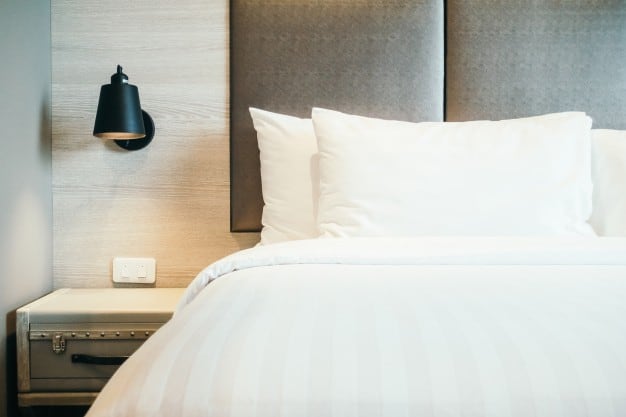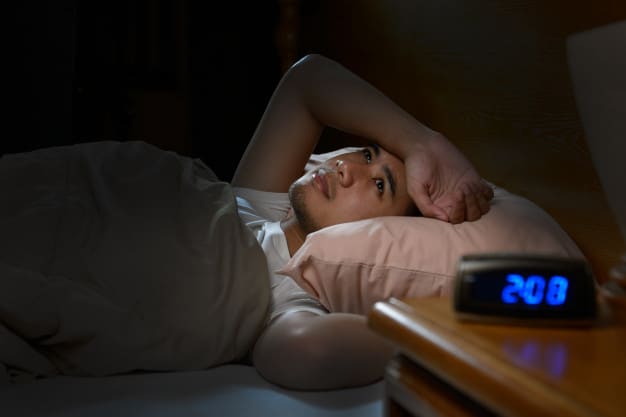We know the feeling all-too-well. Lying in bed, staring at the ceiling, tossing and turning, unable to sleep while a multitude of thoughts zip around in our head. We all have at some point, suffered from insomnia, whether chronic or acute. Current estimates suggest 10-30% of adults live with chronic insomnia.
Sleep is a critically important function that directly impacts our physical and mental health. Many people with insomnia report excessive daytime sleepiness, fatigue, irritability and psychomotor impairments when they are awake. That starts the cycle of worrying about not sleeping which leads to yet more sleepless nights, a vicious cycle that repeats itself nightly.
What Is Stress?
2020 was a stressful year for many of us. Everywhere you look, we are looking at unprecedented levels of stress worldwide. Economic, financial and physical insecurity have always been one of the primary triggers for chronic stress.

Stress, although having many negative connotations, is simply a response that has evolved in humans and animals to allow them to deal with important or potentially dangerous situations.
In humans, stress causes the autonomic nervous system to release hormones such as adrenaline and cortisol. These hormones raise the heart rate to circulate blood more efficiently, preparing the body for a fight-or-flight response, which was vital for our survival in the earlier stages of evolution.
In today’s world, common triggers of stress now are problems at work, relationship difficulties or family trauma.
It is normal to feel stressed occasionally but chronic feelings of stress can cause the autonomic nervous system to be in a heightened state of arousal for extended periods of time. This can severely impact our physical and mental well-being in the long run.
Stress can generally fall into one of 3 categories:
Acute Stress – This time of short term stress often is due to temporary moments of panic and anxiety. It might include being involved in an accident, missing a deadline for work or school, or losing a loved one. You may notice a rise in blood pressure and heart rate, accompanied by feelings of irritability or anxiety.
Episodic Acute Stress – This is an accumulation of separate moments of acute stress. People who feel stressed by daily struggles, or have problems at work or home, may try to cope with their frustrations by indulging in unhealthy behaviours like binge eating or drinking. Some more serious results of episodic acute stress include clinical depression, heart diseases and chronic insomnia.
Chronic Stress – Constantly in a state of anxiety and elevated arousal, many factors can create chronic stress such as poverty, abuse, trauma, grief and loss. Internalizing pain can wear down the mind and body and lead to serious consequences such as depression, anxiety and worry.
Stress and Insomnia
One common side effect of extended periods of stress is that it can cause sleep deprivation. When awake and stressed, we are in a heightened state of alertness and this can cause anxious and worrying thoughts to occur at night when it is time for our mind and body to rest.
Being unable to sleep leads then to frustration and more anxiety, starting the terrible cycle of chronic insomnia.
Insomnia is a common sleep disorder and is defined as difficulty with the onset of sleep maintenance of healthy and restful sleep, or overall sleep quality. A person can be diagnosed with insomnia if these difficulties occur more than 3 times a week, over a period of 3 months.
Common causes of insomnia include:
- Problems at the workplace
- Relationship issues
- Family affairs
- Death or loss of a loved one
- Major injuries or illness
- Major life changes or relocation
People with higher levels of anxiety are at higher risk for developing chronic insomnia. If someone experiences symptoms for fewer than 3 months, then this condition is referred to as short-term or transient insomnia.
Acute insomnia is frequently referred to as adjustment insomnia. It commonly lasts less than a month, and is a direct result of a major change in life such as a new job or relocating to a new country. This is typically resolved when you adjust to the new situation and the levels of stress lowers.
Common consequences of insomnia include:
- Feelings of fatigue throughout the waking day
- Difficulty focusing or maintaining attention
- Decreased performance in social, family and professional settings
- Irritability and lowered levels of psychological tolerance
- Hyperactivity, aggression and other behavioural issues
- Decreased physical and mental energy and motivation
- Increased risk for errors and accidents
Tips for Managing Stress For A More Restful Sleep
First, take a look at your life and determine the cause of stress. Are you struggling with family or relationship issues, or having problems in the office? Once you have identified the cause of stress, you have now a better chance of managing it.
Get some social support through your friends and family, communicating openly and allowing them to listen and offer helpful advice.
Exercise regularly to release endorphins which improves your mood. Go for a light walk or run during the day to burn off any excess negative energy and blow off steam. Exercise at least 2 hours before bedtime to allow your body’s temperature and heart rate to return to normal.
Learn to relax and practice meditation, yoga or breath work to calm the mind and body.
Choose an eco mattress made with organic materials that is proven to increase deep and regenerative sleep. Use only eco-friendly bedding and pillows to minimize the amount of chemicals surrounding your sleep.

Establish and maintain healthy sleeping habits that can include having a bedtime routine, keeping consistent bed and wake up times, and eliminating screen time at a certain time before bedtime.
Eat a healthy diet and avoid junk food and refined sugars that are low in nutritional value and high in calories. Cut back on alcohol, nicotine and caffeine intake.
If you haven’t fallen asleep within 15-30 minutes, try doing something else in another area of your residence. Reading, meditating and listening to music are good activities to quiet the mind. Avoid TV, phone screen time or any other activities that involve blue light devices.
Stress when left unchecked can quickly escalate into a serious mental condition. If you are experiencing insomnia frequently and having the lack of sleep starting to impact your daily life, consider getting professional help from your doctor or therapist.
